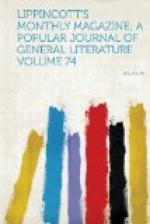A mile from the river’s mouth, and just beyond the limits of Charleston, is one of the finest sandstone-quarries in the world. The United States government monopolizes most of its product in the construction of the magnificent lock and shifting dams in course of erection on the Kanawha to facilitate the transportation of coal from the immense deposits now being mined to the great markets of the Ohio River. A little farther on, the brown front of a timber dam and cribbed lock looks down upon a wild swirl and rush of water; for through a cut gap in its centre Elk flows unobstructed,—a penniless mob having made the opening one night that their canoes might pass free and capitalists be encouraged to remove such worthless stuff as money from the growing industries of the river. Prior to this act of vandalism the water was backed by the dam for a distance of fourteen miles, to Jarrett’s Ford, making a halting-place for rafts and logs, barges and floats, coming down from the vast forests above when rains and snow-thaws raised the river and its tributaries; but now a long stretch of boom catches what it can of Elk’s commerce and is a chartered parasite upon it.
Here at the old dam the mountains close in tightly upon the narrow valley. Log cabins and a few simple frame houses nestle upon diminutive farms; the wild beauty of shoal and eddy, bouldered channel and lake-like stretches of pool, rocky walls and timber-clad peaks, begins to charm the stranger and draw him on and on through scenery as attractive as grand toss of mountains and delve of river can make it.
By dint of poling, pushing, rowing, and pulling, the boats were worked over rapids and pools for almost a score of miles, to where the last rays of the sun slid over a mountain-point and hit Colonel Bangem’s hat as it spun in the air by way of welcome, while the prows clove the water of a lovely eddy lying in front of his camp. The meeting was that of old friends, with the addition of a blush from Bess Bangem and its bright reflection from the Professor’s face.
Tim Price took the colonel to one side mysteriously, and whispered, “I took keer uv the Perfessor my own self: he guv me a power uv trouble, though. Shell I hitch him now, er let him run loose?”
“We’ll turn him loose now, Tim; but if he takes to turning somersets, catch him, loosen his collar, take off his boots, and throw him into the river,” was the colonel’s sober reply.
Scientists nowadays set up Energy as the ancestor of everything, measure the value of its descendants by the quantity they possess of the family trait, and spend their time in showing how to utilize it for the good of mankind in general. Professor Yarren was an apostle of Energy: it absorbed him, filled him. From the weight of the sun to boiled potatoes, from the spring of a tiger to the jump of a flea, from the might of chemical disembodiment to opening an oyster, he calculated, advised, and dilated upon it.




